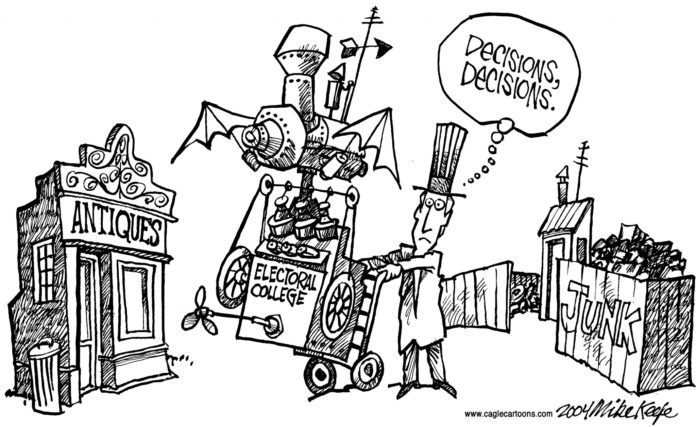BY DAVID PERRYMAN
 I’ve got good news and I’ve got bad news. Which do you want to hear first? That question could have been asked four times to presidential candidates who won the popular vote but did not advance to the White House.
I’ve got good news and I’ve got bad news. Which do you want to hear first? That question could have been asked four times to presidential candidates who won the popular vote but did not advance to the White House.
1824: Andrew Jackson received 38,000 more total votes than John Quincy Adams but did not achieve a majority of the votes in the Electoral College. When Congress was called upon to select a president, the United States House of Representatives chose Adams.
1876: Samuel Tilden, New York governor, bested the next closest presidential candidate by more than a quarter million votes. That lead was not sufficient to offset Rutherford B. Hayes winning the presidency compliments of the Electoral College.
1888: Grover Cleveland won the popular vote by 90,000, but Benjamin Harrison was sworn in as the 23rd president of these United States by securing the greater number of electoral votes.
2000: Al Gore achieved a 540,000 popular vote victory over George W. Bush, but a half million vote lead did not prevent Bush from garnering a 271 to 266 Electoral College victory and the presidency.
There has never been a shortage of opinion with regard to the Electoral College. Its pros and cons have been thoroughly debated with the belief that relatively small population states, like Oklahoma, are ignored during presidential campaigns. Others believe that it prevents the election of a purely regional president.
The Constitution gives each state exclusive and plenary control over the manner in which electoral votes are awarded. It is truly a “State’s Right” issue.
Clearly, the concept of majority rule runs deep in American tradition. A 2015 poll by Public Policy Polling shows that 71% of registered Republicans, 85% of registered Democrats and 87% of independents believe that whoever receives the largest number of votes cast in all 50 states should win the presidency. Across party lines, that equates to eight in 10 Oklahoma voters.
A second question in that survey gave the voters a third option currently used in Maine and Nebraska where electoral votes are awarded by congressional district. Twelve percent chose that option while 17% preferred the current winner-take-all approach and a strong 71% believe that the popular vote should control.
This is no longer simply a rhetorical discussion. Speaker Pro Tem Lee Denney, R-Cushing, has authored HB 1686 to guarantee that 100% of Oklahoma’s electoral votes be awarded to the presidential candidate winning the most popular votes in all 50 states and the District of Columbia.
At least in presidential elections, that would put an end to the Good News/Bad News syndrome. The measure could be heard in the House Elections and Ethics Committee this week. Stand by for news.
– David Perryman, a Chickasha Democrat, represents District 56 in the Oklahoma House of Representatives








